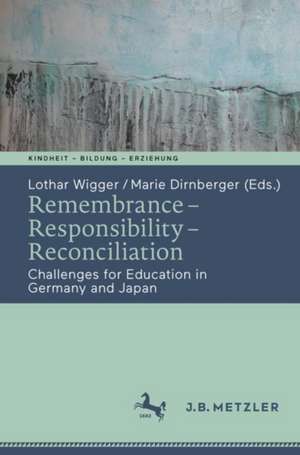Remembrance – Responsibility – Reconciliation: Challenges for Education in Germany and Japan: Kindheit – Bildung – Erziehung. Philosophische Perspektiven
Editat de Lothar Wigger, Marie Dirnbergeren Limba Engleză Paperback – 16 apr 2022
Din seria Kindheit – Bildung – Erziehung. Philosophische Perspektiven
- 17%
 Preț: 456.68 lei
Preț: 456.68 lei - 15%
 Preț: 519.38 lei
Preț: 519.38 lei -
 Preț: 452.79 lei
Preț: 452.79 lei - 15%
 Preț: 442.17 lei
Preț: 442.17 lei -
 Preț: 453.60 lei
Preț: 453.60 lei -
 Preț: 486.80 lei
Preț: 486.80 lei - 15%
 Preț: 490.61 lei
Preț: 490.61 lei - 15%
 Preț: 465.34 lei
Preț: 465.34 lei - 15%
 Preț: 438.23 lei
Preț: 438.23 lei - 15%
 Preț: 448.51 lei
Preț: 448.51 lei -
 Preț: 348.61 lei
Preț: 348.61 lei - 15%
 Preț: 445.58 lei
Preț: 445.58 lei -
 Preț: 489.10 lei
Preț: 489.10 lei -
 Preț: 448.38 lei
Preț: 448.38 lei -
 Preț: 346.50 lei
Preț: 346.50 lei - 13%
 Preț: 383.33 lei
Preț: 383.33 lei
Preț: 465.80 lei
Preț vechi: 548.01 lei
-15% Nou
Puncte Express: 699
Preț estimativ în valută:
89.13€ • 93.06$ • 73.77£
89.13€ • 93.06$ • 73.77£
Carte tipărită la comandă
Livrare economică 05-19 aprilie
Preluare comenzi: 021 569.72.76
Specificații
ISBN-13: 9783662641842
ISBN-10: 3662641844
Pagini: 178
Ilustrații: IX, 178 p. 14 illus., 12 illus. in color.
Dimensiuni: 155 x 235 mm
Greutate: 0.27 kg
Ediția:1st ed. 2022
Editura: Springer Berlin, Heidelberg
Colecția J.B. Metzler
Seria Kindheit – Bildung – Erziehung. Philosophische Perspektiven
Locul publicării:Berlin, Heidelberg, Germany
ISBN-10: 3662641844
Pagini: 178
Ilustrații: IX, 178 p. 14 illus., 12 illus. in color.
Dimensiuni: 155 x 235 mm
Greutate: 0.27 kg
Ediția:1st ed. 2022
Editura: Springer Berlin, Heidelberg
Colecția J.B. Metzler
Seria Kindheit – Bildung – Erziehung. Philosophische Perspektiven
Locul publicării:Berlin, Heidelberg, Germany
Cuprins
Short Biographies.- Remembrance – Responsibility – Reconciliation. New Challenges for Education in Germany and Japan. Introduction.- „The Meaning of Working Through the Past”. Theodor W. Adorno and the Vergangenheitsbewältigung in the Early Years of the Federal Republic of Germany.- Contested Remembrance. The “Old” Federal Republic and “New” Right Politics in Germany.- Japan’s Soft Power and the “History Problem”.- The Nanjing Massacre in Japanese Historiography and Education.- Moral Education and Historical Revisionism.- Educational Tourism for the Nation? Memory and History at Japan’s War Sites.- Japanese War Cemeteries and what they teach us about History.- The Ambivalence of Culture of Remembrance. The Controversy over the “Comfort Women”-Statue in the Relationship between Japan and Germany.- Life Stories as Memory Carriers. Culture of Remembrance and the Importance of Biographical Work and Biographical Research.- Encountering Absurdity through Theater. An Essay on Remembering andEducation about the Atomic Bomb in Hiroshima.- The Problem of Responsibility in Technological Modernity. Reflections Following Günther Anders.
Notă biografică
Lothar Wigger, Dr. phil., is university professor (retired) at the Institute for General Education and Vocational Education at the TU Dortmund University
Marie Dirnberger, M.A in Education, is lecturer at the Institute for German Language at the Foreign Language University in Kyoto, Japan
Textul de pe ultima copertă
Germany and Japan have taken different ways of dealing with the past of the traumatic events of World War II and their own role. Even after 75 years, the battles for remembrance are not over in both countries. Questions about responsibility, about the educational consequences of history and about possibilities for reconciliation with former enemies are constantly being asked anew and require new answers. The contributions in the book address these questions from a Japanese and German perspective on the basis of empirical and historical research, combining historical, educational, and philosophical approaches and opening up new perspectives for academic research as well as for practical educational work by comparing the cultures of remembrance.
Caracteristici
Latest research results of transcultural memory research Empirical research results are combined with basic educational science reflection Forgotten perspective of reconciliation comes into view
